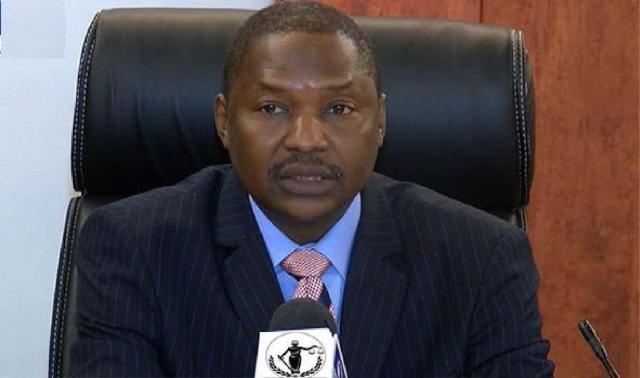The Attorney-General of the Federation (AGF), Abubakar Malami’s statement that the National Assembly’s summon to President Muhammadu Buhari was illegal has degenerated into controversy.
Malami, who is also the Minister of Justice, made the claim on Wednesday, a day before Buhari was billed to honour a summon by the House of Representatives of rising insecurity in the country.
He said, “The management and control of the security sector is exclusively vested in the President by Section 218 (1) of the Constitution as the Commander-in-Chief of the Armed Forces including the power to determine the operational use of the Armed Forces. An invitation that seeks to put the operational use of the Armed Forces to a public interrogation is indeed taking the constitutional rights of law-making beyond bounds.
“As the Commander-in-Chief, the President has exclusivity on security and has confidentiality over security. These powers and rights he does not share. So, by summoning the President on national security operational matters, the House of Representative operated outside constitutional bounds. President’s exclusivity of constitutional confidentiality investiture within the context of the constitution remains sacrosanct.”
Malami reiterated that it was at the president’s discretion whether or not to address the National Assembly on security.
Read Also: Osinbajo To Businesses: Stop Helping Other Continents To Empty Africa
Two Senior Advocates of Nigeria (SAN), Femi Falana and Mike Ozekhome, faulted the claim.
Falana said, “The members of the House of Representatives unanimously resolved to invite President Muhammadu Buhari to address them on the state of the nation with respect to the huge funds appropriated for the war on terror without tangible results.
“The President accepted the invitation and announced that he would address the House on Thursday, December 10, 2020. Regrettably, the President has been under pressure from APC governors not to honour the invitation for fear that they too may be similarly invited to address their respective houses of Assembly.
“On his part, the Attorney-General of the Federation has questioned the constitutional power of the National Assembly to invite the President on the grounds that as the Commander-in-Chief of the Armed Forces, he cannot be compelled to disclose operational details of the defence of the country. With respect, the President is under a moral and legal obligation to honour the invitation. Having accepted the invitation, the President should not allow himself to be embarrassed by turning round to turn down the invitation.
“By the combined effect of sections 88 and 89 of the Constitution, the National Assembly is empowered to summon any public officer, including the President, in the course of investigating any matter concerning which it has the power to make laws and the conduct of affairs of any person, authority, ministry or government department charged, or intended to be charged, with the duty of or responsibility for executing or administering laws enacted by the National Assembly.”
Ozekhome said, “I am not impressed that presidential aides dampen natural integrity by always telling the President to do what is wrong, even at the expense of the good of the citizens.
“Even, if the Constitution does not provide for such, the buck stops on the table of the President.
“When Buhari’s regime is gone, everybody will remember the name Buhari and not Malami.
“To me, I think he should give the best advice to the President in the interest of the country. And such advice should bring development and growth and not self-history.
“Even, if the Constitution does not say so, our system of governance is patterned after America’s, where the citizens see their President every day. When last did we see Buhari? We only hear from the media aides. Malami is indulging in self-history,” Ozekhome said.
He noted, “It is right and ethical for Buhari to appear and address the National Assembly on the state of the nation. The National Assembly has the constitutional power as enshrined in Section 5 of the 1999 Constitution.
“By sections 88 and 89, it has the power of oversight over any person or arm of government.
“Therefore, it is wrong for Malami to say the National Assembly lacks powers to summon the President. The President should attend in the best interest of the country.”



Leave a Reply